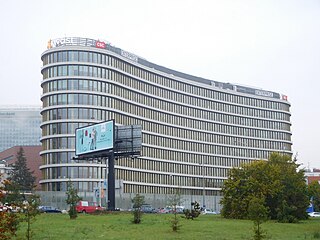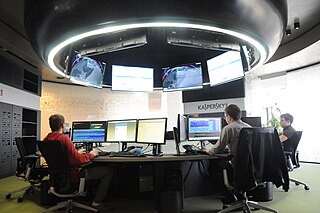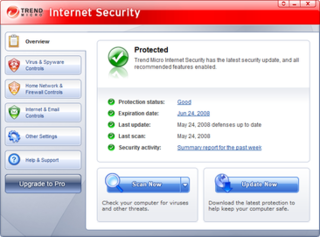Igor Muttik | |
|---|---|
 | |
| Born | 1962 (age 61–62) Russia |
Igor Muttik (born 1962 in Russia) is a computer security expert, researcher and inventor.
Igor Muttik | |
|---|---|
 | |
| Born | 1962 (age 61–62) Russia |
Igor Muttik (born 1962 in Russia) is a computer security expert, researcher and inventor.
Igor Muttik is a Senior Principal Research Architect with McAfee which is part of Intel Corporation since 2011. He started researching computer malware in 1980s when anti-virus industry was in its infancy. Muttik holds a PhD in physics and mathematics from the Moscow State University. He has been a member of CARO (Computer Antivirus Research Organization) since 1994, and worked as a virus researcher for Dr. Solomon's Software. Since 1998 Muttik was running McAfee’s anti-malware research in EMEA and switched to his architectural role in 2002.
In 2008 he was one of the co-founders of AMTSO [1] (Anti-Malware Testing Standards Organization) and was on the Board of AMTSO for 3 years. Muttik was also a co-founder of Industry Connections Security Group [2] (ICSG is part of IEEE) - he is the chair of the taggant system working group, [3] vice-chair of the ICSG [2] and CMX (clean file metadata exchange) working groups. [4] The taggant system and CMX are both part of AMSS (Anti-Malware Support Service). [5]
He is a regular speaker at major international security conferences like Black Hat Briefings, [6] [7] [8] RSA Conference, DEF CON, [9] Virus Bulletin, EICAR. Muttik lives in the UK
Muttik is a visiting professor at the Information Security Group [10] at Royal Holloway, University of London. He is heading McAfee's work for the security research of mobile devices funded by EPSRC: [11]
His current work is focused on the architecture of security solutions for smart devices and on hardware-assisted security technologies.
In May 2009 Muttik's blog about the risks associated with the use of software packers caused criticism by Rob Rosenberger. [16] [17] Despite this incident Muttik is working closely today with several software companies developing software packers (like Themida) on the taggant system.[ citation needed ]
Malware is any software intentionally designed to cause disruption to a computer, server, client, or computer network, leak private information, gain unauthorized access to information or systems, deprive access to information, or which unknowingly interferes with the user's computer security and privacy. Researchers tend to classify malware into one or more sub-types.

McAfee Corp., formerly known as McAfee Associates, Inc. from 1987 to 1997 and 2004 to 2014, Network Associates Inc. from 1997 to 2004, and Intel Security Group from 2014 to 2017, is an American global computer security software company headquartered in San Jose, California.

Antivirus software, also known as anti-malware, is a computer program used to prevent, detect, and remove malware.
Linux malware includes viruses, Trojans, worms and other types of malware that affect the Linux family of operating systems. Linux, Unix and other Unix-like computer operating systems are generally regarded as very well-protected against, but not immune to, computer viruses.
The EICAR Anti-Virus Test File or EICAR test file is a computer file that was developed by the European Institute for Computer Antivirus Research (EICAR) and Computer Antivirus Research Organization (CARO) to test the response of computer antivirus (AV) programs. Instead of using real malware, which could cause real damage, this test file allows people to test anti-virus software without having to use a real computer virus.
The European Institute for Computer Antivirus Research (EICAR) was founded in 1991 as an organization aiming to further antivirus research and improving development of antivirus software. Recently EICAR has furthered its scope to include the research of malicious software (malware) other than computer viruses and extended work on other information security topics like content security, Wireless LAN security, RFID and information security awareness. EICAR also organizes international security conferences most years, as well as a number of working groups or 'task forces'.

Avast Software s.r.o. is a Czech multinational cybersecurity software company headquartered in Prague, Czech Republic, that researches and develops computer security software, machine learning, and artificial intelligence. Avast has more than 435 million monthly active users and the second largest market share among anti-malware application vendors worldwide as of April 2020. The company has approximately 1,700 employees across its 25 offices worldwide. In July 2021, NortonLifeLock, an American cybersecurity company, announced that it was in talks to merge with Avast Software. In August 2021, Avast's board of directors agreed to an offer of US$8 billion.
CARO is an organization that was established in 1990 to research and study malware.

McAfee VirusScan is an antivirus software created and maintained by McAfee. Originally marketed as a standalone product, it has been bundled with McAfee LiveSafe, McAfee AntiVirus Plus, McAfee Total Protection and McAfee Gamer Security since 2010. McAfee LiveSafe is antivirus protection that defends against viruses, online threats, and ransomware with online and offline protection integrates antivirus, firewall and anti-spyware/anti-ransomware capabilities.
In 2006, British telecom company BSkyB started offering Sky Broadband customers a branded version of VirusScan for free upon broadband modem installation.
Rogue security software is a form of malicious software and internet fraud that misleads users into believing there is a virus on their computer and aims to convince them to pay for a fake malware removal tool that actually installs malware on their computer. It is a form of scareware that manipulates users through fear, and a form of ransomware. Rogue security software has been a serious security threat in desktop computing since 2008. An early example that gained infamy was SpySheriff and its clones, such as Nava Shield.

Security and Maintenance is a component of the Windows NT family of operating systems that monitors the security and maintenance status of the computer. Its monitoring criteria includes optimal operation of antivirus software, personal firewall, as well as the working status of Backup and Restore, Network Access Protection (NAP), User Account Control (UAC), Windows Error Reporting (WER), and Windows Update. It notifies the user of any problem with the monitored criteria, such as when an antivirus program is not up-to-date or is offline.

VirusTotal is a website created by the Spanish security company Hispasec Sistemas. Launched in June 2004, it was acquired by Google in September 2012. The company's ownership switched in January 2018 to Chronicle, a subsidiary of Google.

Malwarebytes Inc. is an American Internet security company that specializes in protecting home computers, smartphones, and companies from malware and other threats. It has offices in Santa Clara, California; Clearwater, Florida; Tallinn, Estonia; Bastia Umbra, Italy; and Cork, Ireland.

Kaspersky Lab is a Russian multinational cybersecurity and anti-virus provider headquartered in Moscow, Russia, and operated by a holding company in the United Kingdom. It was founded in 1997 by Eugene Kaspersky, Natalya Kaspersky and Alexey De-Monderik. Kaspersky Lab develops and sells antivirus, internet security, password management, endpoint security, and other cybersecurity products and services.
MS Antivirus is a scareware rogue anti-virus which purports to remove virus infections found on a computer running Microsoft Windows. It attempts to scam the user into purchasing a "full version" of the software. The company and the individuals behind Bakasoftware operated under other different 'company' names, including Innovagest2000, Innovative Marketing Ukraine, Pandora Software, LocusSoftware, etc.

Trend Micro Internet Security is an antivirus and online security program developed by Trend Micro for the consumer market. According to NSS Lab comparative analysis of software products for this market in 2014, Trend Micro Internet Security was fastest in responding to new internet threats, but as of June 2024 based on the chat support there is no known mechanism as with Microsoft Defender Antivirus to submit false positives like "Incorrectly detected as malware/malicious" or "Incorrectly detected as PUA " which may point to cutting corners and be the cause of application mislabeling e.g. as ransomware, while the mechanism for detecting real threats is not specified.
Eddy Willems, is a Belgian computer security expert and author of security blogs and books, active in international computer security organizations and as a speaker at information security-related events.
A software taggant is a cryptographic signature added to software that enables positive origin identification and integrity of programs. Software taggants use standard public key infrastructure (PKI) techniques and were introduced by the Industry Connections Security Group of IEEE in an attempt to control proliferation of malware obfuscated via executable compression.
The Industry Connections Security Group is a global group of computer security entities that have come together under IEEE to pool their experience and resources in combating the systematic and rapid rise in computer security threats.